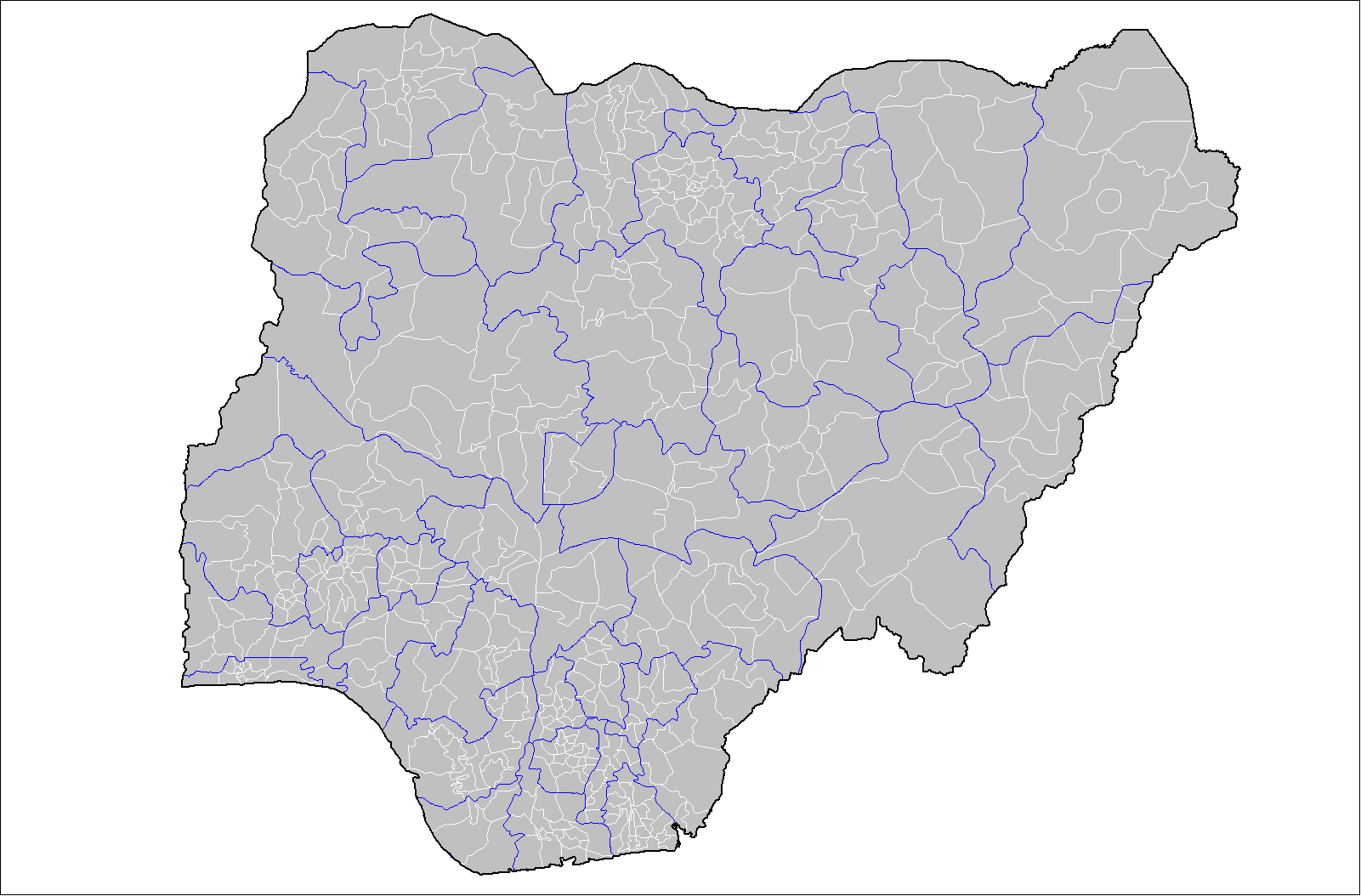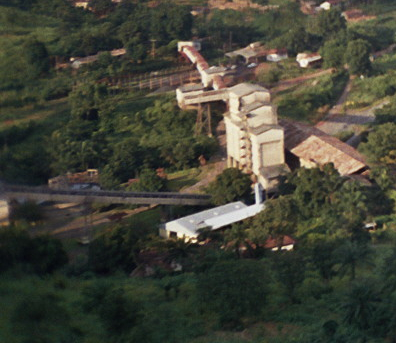|
Umuahia
Umuahia () is the capital city of Abia State in southeastern Nigeria. Umuahia is located along the rail road that lies between Port Harcourt to its south, and Enugu city to its north. Umuahia has a population of 359,230 according to the 2006 Nigerian census. Umuahia is renowned for being a railway and agricultural market center, which attracts traders and farmers from neighboring towns to sell their produce, such as yams, cassava, corn (maize), taro, citrus fruits, and palm oil and kernels. There are industries that help drive its economy, such as a brewery and a palm-oil-processing plant. Nigeria's National Root Crops Research Institute, at Umudike, is adjacent to the town. So also is the Michael Okpara University of Agriculture, Umudike (MOUAU). Umuahia also has several colleges including Trinity College (theological), Government College Umuahia, Holy Rosary Girls Secondary School and hospitals like the Federal Medical Centre, Umuahia (formerly Queen Elizabeth Hospital). ... [...More Info...] [...Related Items...] OR: [Wikipedia] [Google] [Baidu] |
Abia State
Abia is a state in the Southeastern region of Nigeria. The state's capital is Umuahia and its most populous city is Aba. Abia is bordered the west by Imo, east by Cross River, south by Rivers, northwest by Anambra and northeast by Enugu and Ebonyi. The state is divided between the Niger Delta swamp forests in the south and the Cross–Niger transition forests. The Imo and Aba Rivers flows along the state's western and southern borders respectively. The land for agriculture as well as the production of crude oil and natural gas ranks Abia as the joint-eighth highest Human Development Index in Nigeria since 2019. Abia's history begins as part of the Aro Confederacy until their defeat in the early 1900s by the British troops during the Anglo-Aro War. After the war, the area was incorporated into the Southern Nigeria Protectorate. After Nigeria's independence in 1960, Abia became part of the post-independence Eastern Region until 1967 before the region was split, ... [...More Info...] [...Related Items...] OR: [Wikipedia] [Google] [Baidu] |
Umuahia North
Umuahia North is a Local Government Area of Abia State, Nigeria. Its headquarters is in the city of Umuahia. It has an area of 245 km and a population of 220,660 at the 2006 census. The postal code of the area is 440. Economy The Umuahia North LGA is home to a number of markets that draw many buyers and sellers of various goods, including the Ubani major market and the Industrial market in Azueke Ndume Ibeku. A number of banks, hotels, businesses, as well as government-owned facilities are also located in the LGA. Geography The entire area of Umuahia North LGA is 245 km2, and its average annual temperature is 27 °C. With the average wind speed in the region being 11 km/h, the LGA experiences two major seasons, the dry and the rainy. Created Umuahia North Local Government Area LGA was created in August 1991. Localities Towns and Villages in Umuahia North Local Government: * Umuahia * Umukabia * Umuawa Alaocha * Amaogwugwu * Umuagu * Umuekwule * Ofeme * Ama ... [...More Info...] [...Related Items...] OR: [Wikipedia] [Google] [Baidu] |
Federal Medical Centre, Umuahia
Federal Medical Centre, Umuahia is a federal government of Nigeria medical centre located in Umuahia, Abia State, Nigeria Nigeria, officially the Federal Republic of Nigeria, is a country in West Africa. It is situated between the Sahel to the north and the Gulf of Guinea in the Atlantic Ocean to the south. It covers an area of . With Demographics of Nigeria, .... The current chief medical director is Azubuike Onyebuchi. __TOC__ History Federal Medical Centre, Umuahia was established in 1945. The hospital was formerly known as Queen Elizabeth Specialist Hospital, Umuahia and was renamed to Federal Medical Centre, Umuahia in November 1991. References Hospitals in Nigeria {{Africa-hospital-stub ... [...More Info...] [...Related Items...] OR: [Wikipedia] [Google] [Baidu] |
Umuahia South
Umuahia South is a Local Government Area of Abia State, Nigeria. Its headquarters is at Apumiri in Ubakala.towns include apumiri,ezeleke,ekenobizi etc It has an area of 140 km and a population of 138,570 at the 2006 census. The postal code of the area is 440. Climate Umuahia has a Tropical monsoon climate (Classification: Am) and is zero meters (no feet) above sea level. The district's average annual temperature is -0.88% lower than Nigeria's averages at 28.58°C (83.44°F). Approximately 273.49 millimeters (10.77 inches) of precipitation and 263.52 rainy days (72.2%) are usual for Umuahia each year. Locality Towns under Umuahia South Local Government Area: * Ahiaukwu * Amakama * Ubakala * Nsirimo * Ezeleke * Ogbodiukwu * Ohiaocha * Omaegwu * Old Umuahia See also *List of villages in Abia State This is a list of INEC Polling Units in Abia State, Nigeria organised by local government areas of Nigeria, local government area (LGA) and district/area (with postal c ... [...More Info...] [...Related Items...] OR: [Wikipedia] [Google] [Baidu] |
Umuopara
Umuopara is a clan of the Igbo people of Umuahia, Abia State, Nigeria. it's one of the five clans that make up Umuahia (The Capital City of Abia State). Umuopara lies on the western border of Abia with Imo State. The natural boundaries between the Umuopara of Umuahia, Abia State and its Umungwa and Udo-Mbaise neighbours both in Imo state is the Imo River. The Umuopara reside in seven villages known as ''umunne asaa'': Ezeleke, Ogbodiukwu, Ekenobizi, Ehume, Ogbodinibe, Umuihi and Umunwawa. Culture Umuopara is generally regarded as the cradle of Umuahia civilization. It was known for the Egwu festival celebrated at Omaegwu. Umuopara later became known for the Ekpe festival which is also celebrated by Ibeku and Ohuhu clans in Umuahia. The first ever Ekpe festival took place in Ogbodiukwu Umuopara. The new ''Yam festival'' is also celebrated in Umuopara. The supreme deity in Umuopara during pre-colonial times was Ojam. Most of the modern-day residents are Christians, predominantly ... [...More Info...] [...Related Items...] OR: [Wikipedia] [Google] [Baidu] |
Ikwuano
Ikwuano is a Local Government Area of Abia State, Nigeria. Its headquarters is in Isiala Oboro. The name 'Ikwuano' etymologically indicates that there are four different ancient kingdoms that make up the community called Ikwuano. These include Oboro, Ibere, Ariam/Usaka and Oloko. The postal code of the area is 440. It is one of the five Local Government Areas that make up the Abia Central Senatorial District. As at 2024, the executive chairman is Dr. Anthony Nzeribe Nwaubani. Obi Aguocha currently serves as the Federal Representative representing Ikwuano/Umuahia North and South Federal Constituency at the House of Representatives. The member representing Ikwuano State Constituency at the Abia State House of Assembly is Engr. Boniface Isienyi. History The present Ikwuano Local Government Area was part of the Bende Division in the then Southern Province created by the British Colonial Government as part of their “Divide and Rule” system of government and administratio ... [...More Info...] [...Related Items...] OR: [Wikipedia] [Google] [Baidu] |
Ubakala
Ubakala is a large town in Umuahia South Local Government Area (LGA) of Abia State, Nigeria. It is one of the major ancient clans of Umuahia.Hanna, Judith. (2006). Dance and Social Structure: The Ubakala of Nigeria. Journal of Communication. 29.184-192. 10.1111/j.1460-2466.1979 A popular market for which it is known is the Apumiri Market. Umuahia South Local Government Area Headquarters is located at Apumiri as well. Ubakala is situated southwards of Umuahia main township. Its well defined boundaries geographically places it at the North of Ntigha (a community in Isiala-Ngwa LGA). History There is the popular belief that Ubakala didn't migrate from anywhere in the distant past. Legend however has it that a wealthy merchant called Uba (or Ubaka according to other oral sources) founded what we know today as Ubakala. It was said that during the mass exodus of the Igbo through the Awka-Okigwe axis, he sojourned with his family, goods and servants across undulating hills and valle ... [...More Info...] [...Related Items...] OR: [Wikipedia] [Google] [Baidu] |
Local Government Areas In Nigeria
Nigeria has 774 local government areas (LGAs), each administered by a local government council consisting of a chairman, who is the chief executive, and other elected members, who are referred to as councillors. Each LGA is further subdivided into a minimum of ten and a maximum of twenty wards. A ward is administered by a councillor, who reports directly to the LGA chairman. The councillors fall under the legislative arm of the Local Government, the third tier of government in Nigeria, below the state governments and the federal government. Functions The functions of local governments are detailed in the Nigerian constitution and include the following: * Economic recommendations to the State. * Collection of taxes and fees. * Establishment and maintenance of cemeteries, burial grounds and homes for the destitute or infirm. * Licensing of bicycles, trucks (other than mechanically propelled trucks), canoes, wheelbarrows and carts. * Establishment, maintenance and regulation of m ... [...More Info...] [...Related Items...] OR: [Wikipedia] [Google] [Baidu] |
Igbo Language
Igbo ( , ; Standard Igbo: ''Ásụ̀sụ́ Ìgbò'' ) is the principal native language cluster of the Igbo people, an ethnicity in the Southeastern part of Nigeria. Igbo languages are spoken by a total of 31 million people. The number of Igboid languages depends on how one classifies a language versus a dialect, so there could be around 35 different Igbo languages. The core Igbo cluster, or Igbo proper, is generally thought to be one language but there is limited mutual intelligibility between the different groupings (north, west, south and east). A standard literary language termed 'Igbo izugbe' (meaning "general igbo") was generically developed and later adopted around 1972, with its core foundation based on the Orlu, Imo, Orlu (Isu people, Isu dialects), Anambra (Awka dialects) and Umuahia (Ohuhu dialects), omitting the nasal vowel, nasalization and aspiration (phonetics), aspiration of those varieties. History The first book to publish Igbo terms was ''History of the Mis ... [...More Info...] [...Related Items...] OR: [Wikipedia] [Google] [Baidu] |
Ohuhu
The Ohuhu clan of Umuahia north in Abia State Nigeria of the Igbo people, also referred to as ''Ohonhaw'', form a unique community of people in Umuahia, Abia state, Nigeria, consisting of several Autonomous Communities including Umukabia,Ohiya, Isingwu, Ofeme, Afugiri, Nkwoegwu, Umuawa, Umudiawa, Akpahia, Umuagu, Amaogugu, Umule-Eke-Okwuru, Umuhu-Okigha, Amaogwugwu called Eziama/ Amaudo in Ohuhu etc. Ohuhu was formerly known as Umuhu-na-Okaiuga, or better-known as Ohu-ahia-na-otu. Until 1949, the Umuopara clan used to be part of Ohuhu before they were carved out politically. Origin There are several beliefs regarding the origin of Ohuhu people. One view is that the Ohuhu people did not migrate from anywhere. This view is supported by the fact that most communities in Ohuhu have their old or abandoned settlements, Okpuala, also located in Ohuhu. While this view sounds plausible, some villages in Ohuhu today can convincingly trace their old settlements to places outside Ohuhu, ev ... [...More Info...] [...Related Items...] OR: [Wikipedia] [Google] [Baidu] |
Enugu (city)
Enugu ( ; ) is the capital city of Enugu State in Nigeria. The city had a population of 4,690,100 spread across the three Local government areas of Nigeria, LGAs of Enugu East, Enugu North and Enugu South, according to the 2022 Nigerian census. History Early history Énugwú (Igbo verbalization of Enugu) is the capital city of Enugu State in Nigeria. It is located in southeastern part of Nigeria. The name Enugu is derived from the two Igbo words Énú Ụ́gwụ́, meaning "hill top", denoting the city's hilly geography. Enugu acquired township status in 1917 and was called Enugwu-Ngwo, but because of the rapid expansion towards areas owned by other indigenous communities, the city was renamed Enugu in 1928. The first settlement in the Enugu area was the small Nike village of Ogui from present day Igala which was present since the era of the Atlantic Slave Trade.Udo, p. 88. ''Nike'' in the Igbo language means "with strength or power".Williams, p. 196. The Nike people acquir ... [...More Info...] [...Related Items...] OR: [Wikipedia] [Google] [Baidu] |


